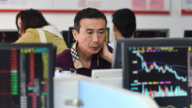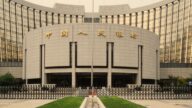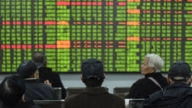【新唐人2014年04月07日訊】今年以來,因人民幣貶值,打回之前的匯率原形,中國大陸的房價、出口、和生產指數持續下降,美元出逃,地方債務高築,外界認為種種跡象,打破了中國經濟增長的神話,中國經濟正在朝著經濟學家們預言的硬著陸奔跑。三大跨國投資銀行形容,中國將可能成為新興市場金融動盪的風暴中心。
最近,美國花旗集團、日本野村集團、瑞士信貸集團等跨國投資銀行,紛紛發出警告說,人民幣貶值可能會導致流入中國的熱錢突然轉向。
今年一季度,人民幣匯率創下歷年最高的2.6%的季度貶幅,將去年一年以來的漲幅幾乎打回原形。《新華社》承認,人民幣貶值已經導致熱錢撤離。報導說,海外投資人「看空」中國經濟的市場氛圍有所上升,加上人民幣改變單邊升值趨勢,導致部分投資者撤離與中國相關的投資。
熱錢,又稱游資或投機性短期資本。熱錢的投資對像主要是外匯、股票、基金及衍生產品市場等,具有投機性強、流動性快、隱蔽性強等特徵。
《新華社》的這篇報導說,使用離岸人民幣在中國內地進行投資的基金公司,管理的資產規模,3月份萎縮的幅度創下了9個月來之最。這些基金公司其中最大的14家,管理的資產,在3月份減少了53億元人民幣,是去年6月份「錢荒」以來資產萎縮最多的一個月。
外界對人民幣貶值的原因持有不同的看法,有經濟學家認為,是中國經濟在衰退,出口萎縮,人民幣「無可奈何花落去」,也有一種看法認為,是中共央行故意讓人民幣貶值,企圖使中國的出口重新恢復競爭力。
美國多元投資創辦人周威宇:「原來很多資金進去,認為人民幣絕對不會貶值,所以很多資金進去希望有一個套利的機會,人民幣開始貶值後,有一些產品就相對變得有一些壓力,所以人民幣貶值,對中國市場是一個兩面刃,雖然有助於出口,可是貶值過度也會引起資金外逃。」
1997年亞洲金融風暴之前,東南亞也是貨幣持續升值,後來出口衰退,貨幣貶值引發資金外逃。據中共海關統計顯示,2月份,中國出口下降20.4%,貿易逆差為1,397億9000萬元,去年同期貿易順差為934億3000萬元。
另外,根據「滙豐」銀行公布的數據,中國採購經理人指數PMI,連續三個月來處於50以下,而且持續下降,說明中國經濟出現放緩狀態。
金融專家周威宇認為,中國現在經濟衰竭的原因,是2008年全球金融風暴時,大量印製人民幣救市造成的後遺症。
中國金融專家周威宇:「本來可能應該裁員,工廠倒閉,那時多發行人民幣,然後讓它房地產多燒了兩三年,到現在它慢慢出現這個問題,所以我覺得是2008年後金融風暴的後遺症,不一定完全是美聯儲退場造成的狀態。」
「花旗集團」在最新發佈的報告中指出,可能會發生「以中國為震源地的第二次緊縮恐慌」,「花旗」建議客戶,準備面臨第2波的「縮減恐慌」。
中國金融智庫研究員鞏勝利:「外流,貨幣緊張的情況可能還要延續一段時間,最嚴峻的時候可能是8月,因為10月份美國的寬鬆貨幣要全部退出。」
大陸經濟學者鄭先生:「歷史的發展規律不以個人或團體的意志為左右,我們目前金融體系最大的問題是,不公平而且也沒有公開,肯定也不公正,當一個地方發展空間越來越狹隘的時候,越來越受限制的時候,而且受到歧視和打壓的時候,他們當然知道趨吉避兇。」
《新浪財經》網站去年7月從各個角度分析,可能有超過萬億外資撤離中國。
河北天津市「南開大學國經所」客座教授劉杉撰文指出,熱錢流出中國,不僅會刺破中國的經濟泡沫,影響人民幣國際化進程,還會刺激中國居民擠兌美元,進一步造成人民幣貶值,使自己資產美元化。而泡沫破裂和資產美元化的結果就是貨幣通縮。
Hot Money Races out of China
This year, Renminbi (RMB) has dropped so badly that domestic
housing, export, and production index have declined.
Consequently, the dollars go out and local debts go up.
The phenomenon is believed to be breaking the myth of the
economic growth in China.
China’s economy is taking a battering as expected
by the economists.
Three multinational banks have warned recently, China is
likely to be the storm at the center of the emerging market.
Recently, U.S. Citigroup, Japan’s Nomura Group, and
Credit Suisse Group,
have respectively warned that RMB devaluation, may have
a reverse affect upon hot money (the flow of funds).
This year, the RMB exchange rate has hit the record low,
at a 2.6 percent decrease in a quarter.
The Communist mouthpiece Xinhua News Agency reported,
RMB devaluation has led to the withdrawal of hot money.
It is said that some foreign investors are leaving China as they
did not believe their would be a rebound within
the Chinese market,
and also due to the unilateral depreciation of RMB.
In financial markets, hot money is also known as refugee capital,
or speculative capital.
Hot money investments are mainly in foreign exchange, equities,
and funds. They can move very quickly in and out of markets.
Xinhua reported, offshore yuan investment in mainland China
has dropped in most of March in the past nine months.
Of the 14 major companies assessed, there was a reduction of
5.3 billion yuan (US$ 850 million) in March,
the sharpest decline since money shortage in last June.
Economists hold different views about the RMB devaluation.
Some believe that the Chinese economy is in recession, with
weakening in exports and yuan.
Others believe, central bank deliberately weakened yuan
to restore the export competition.
Rex Zhou, New Assets Investment Advisors founder: “A lot of
money went in to the system,
believing in the strength of the yuan, hoping to earn
quick interests.
After the devaluation of yuan, pressure starts to mount
upon some of the products.
The devaluation of yuan has become a double-edged sword.
It helps the exports, but also causes capital outflow."
Prior to the 1997 Asian financial crisis, Southeast Asia also
experienced continued depreciation of the currency,
followed by weakening exports and currency devaluation,
and subsequently led to capital outflow.
According to Communist China Customs statistics, China’s
exports fell 20.4 percent in February,
a trade deficit of 139.79 billion yuan, compared with a surplus
of 93.43 billion yuan from last year.
In addition, HSBC Bank of China, showed China’s purchasing
managers index PMI,
had declined to below 50 for three consecutive
months and continued to remain low,
indicating a slowing down in China’s economy.
Financial expert Rex Zhou believes that economic
failure in China,
is most likely due to mass printing of RMB during
the global financial crisis in 2008.
Rex Zhou: “The supposed layoffs and factory closures were
saved by the mass printing of RMB,
lasting for a good couple of years.
But now the problems are surfacing.
I believe it is more of an issue caused by the monetary policy
during the 2008 financial crisis,
not necessarily due to the withdrawal of the Fed’s reserve."
Citigroup’s latest report, told clients to brace themselves for
a second phase of the “taper tantrum",
which rocked emerging markets last year, this time,
with China at the eye of the storm.
Gong Shengli, Chinese financial think tank researcher:
“The capital outflows and stressful currency situations, may
have to continue for some time.
It may be the toughest in August as it is getting close to the
complete withdrawal of Fed’s monetary policy,
quantitative easing (QE), in October."
Mr. Cheng, anonymous Chinese economist: “History does not
develop according to the will of an individual or a group.
The biggest problems in China’s financial system, are that it is not
fair and it is not open.
When the development is getting more narrow and restricted by
discrimination and suppression, it is only wise to escape."
The Chinese Sina Finance Website analyzed last July, that more
than one trillion yuan (US$160 billion) of foreign investment,
might have withdrawn from China.
Visiting Professor for Institute of International Economics,
Nankai University, Liu Shan,
argued that hot money outflow will break China’s economic
bubble economy,
affect the process of RMB internationalization, and push the
Chinese run on the dollar,
causing further devaluation of yuan and dollarization
of Chinese assets.
The consequence of the bubble bursting and the dollarization of Chinese
assets, is the deflation of currency.
Interview & Edit/Liuhui Post-Production/Shucan

























